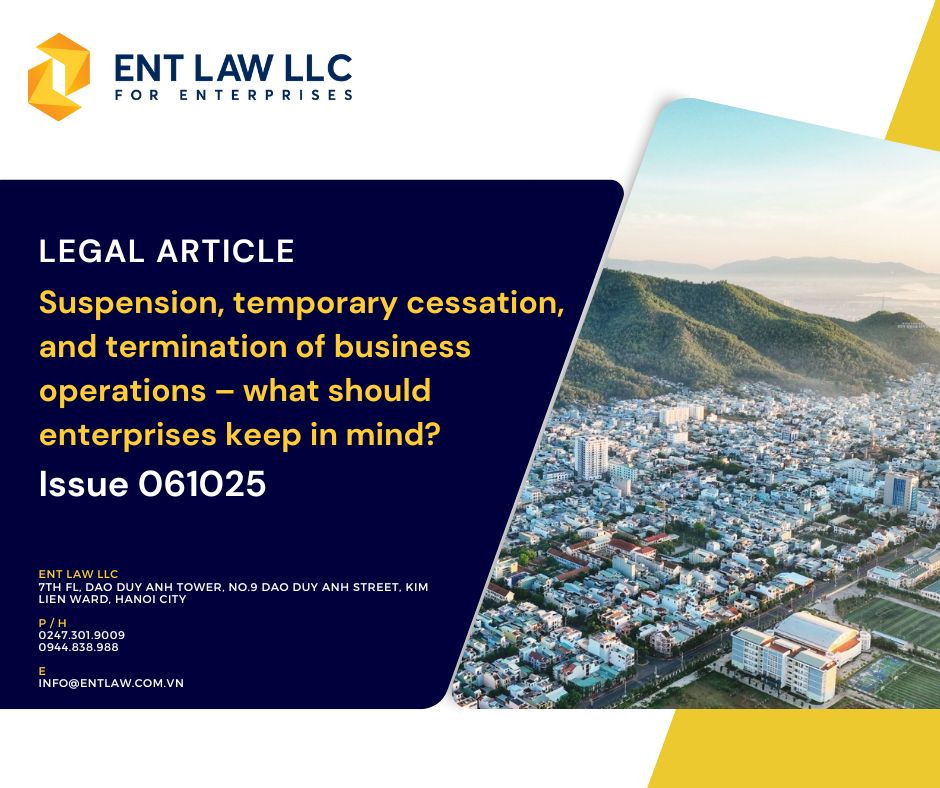Dear Valued Clients,
In the course of doing business, not every enterprise can maintain operations continuously and always encounter favorable conditions. There may be times when an enterprise needs to suspend business activities to restructure or adjust its strategy; in some cases, it may be forced to suspend operations by order of a competent authority; or it may be compelled to terminate operations due to violations of law.
Vietnam’s Law on Enterprises anticipates such situations and provides specific rules on the conditions, procedures, and the rights and obligations of enterprises in each case.
Understanding these rules not only helps businesses respond proactively but also avoid potential legal, financial, and labor-related risks. This article offers an overview of suspension, temporary cessation, and termination of operations, along with key guidance for enterprises.
1. Voluntary suspension of business operations
The current Law on Enterprises of Vietnam allows enterprises to proactively suspend their business activities. This is often a solution when an enterprise seeks to reduce costs, restructure its organization, or wait for new market opportunities. Under Article 34.2 of Decree 168/2025/ND-CP, “suspension of business” refers to the legal status of an enterprise that is temporarily suspending business in accordance with this Decree.
However, an enterprise cannot simply “stop” without notice. The law requires enterprises to submit a written notice to the Business Registration Office and the Tax Authority at least 03 working days before suspension. The notice must specify the suspension period (which may be extended but not exceeding one year for each registration) (Article 60, Decree 168/2025/ND-CP).
This means that during the suspension, the enterprise is not permitted to sign contracts or carry out business transactions. Otherwise, it will be deemed a violation and subject to penalties.
When resuming operations (i.e., ending the suspension), the enterprise must also notify the Business Registration Office before restarting its activities to ensure compliance with the law.
2. Suspension or temporary cessation at the request of authorities
Unlike voluntary suspension by the enterprise as described in Section [1], suspension or temporary cessation is an administrative measure imposed by competent authorities when an enterprise commits serious violations, such as operating without a license, creating safety hazards, violating environmental regulations, or affecting national defense, security, or public health – though not yet to the extent of being forced to terminate operations.
In such cases, suspension or temporary cessation is ordered for the purposes of investigation, assessment of violations, and to allow the enterprise to remedy its breaches.
The suspension decision will specify the duration, scope, and reasons. During this time, the enterprise must cease all relevant activities. If it fails to comply, the enterprise may face harsher sanctions, such as revocation of its Enterprise Registration Certificate, which leads to termination of operations.
During suspension imposed by authorities, the enterprise must still pay outstanding taxes, social insurance, health insurance, and unemployment insurance contributions; and continue fulfilling debt obligations and performing contracts with customers and employees, unless otherwise agreed among the enterprise, creditors, customers, and employees (Article 206.3, Law on Enterprises).
3. Termination of operations
Under Article 206 of the Law on Enterprises, a competent State authority may order an enterprise to terminate operations in cases such as: violations of business conditions and sectors applicable to enterprises and foreign investors; violations of tax, environmental, or other laws; or termination pursuant to a court decision.
Enterprises ordered to terminate operations are generally those that have committed serious violations that cannot be remedied, or have failed to remedy violations during suspension, thereby subject to compulsory enforcement by State authorities. In some cases, the enterprise may previously have been suspended but did not comply with the requirements, resulting in forced termination.
4. Risks of non-compliance
Suspension or temporary cessation of business can entail significant legal risks if enterprises fail to comply with the law. For instance, if an enterprise fails to notify suspension in due time, it may face administrative fines, and its information may be “frozen” on tax and business systems. If it continues operations during suspension or temporary cessation, contracts entered into or performed during this period may be invalid, and the enterprise may face administrative penalties for non-compliance. And if it does not remedy violations during the period of suspension or temporary cessation, it risks having its license revoked, leading to forced termination of operations.
5. Conclusion
Suspension, temporary cessation, or termination of operations are all situations that may occur in the life cycle of an enterprise. What is important is that investors and business owners fully understand the procedures and associated obligations, so they can select the appropriate solution and minimize legal risks. With careful preparation and strict compliance with legal requirements, enterprises can either “pause to move forward” or bring their business journey to a close in an orderly, safe, and lawful manner, depending on the circumstances.
Best regards,
ENT Law LLC
[1] The Law on Enterprises 2020 as amended and supplemented in 2025.

 Tiếng Việt
Tiếng Việt


Issue of January, 2025 – Decree No. 20/2026/ND-CP Guiding Resolution No. 198/2025/QH15 on the Development of the Private Economy
Dear Valued Clients, Decree No. 20/2026/ND-CP (“Decree 20”) was promulgated by the Government on January 15, 2026, providing...
Jan
RECRUITMENT ANNOUNCEMENT
Position Lawyer / Trainee Lawyer(Priority given to candidates who are currently enrolled in or have completed the Lawyer...
Jan
Issue of December 2025 – Amended Personal Income Tax Law
Dear Valued Clients, The National Assembly of Vietnam officially adopted the Fourth Draft of the Law on Personal...
Dec
ENT Law LLC at TECHFEST Vietnam 2025 – Hanoi
Dear Clients, Associates and Friends, ENT Law LLC is honored to take part in TECHFEST Vietnam 2025, the...
Dec